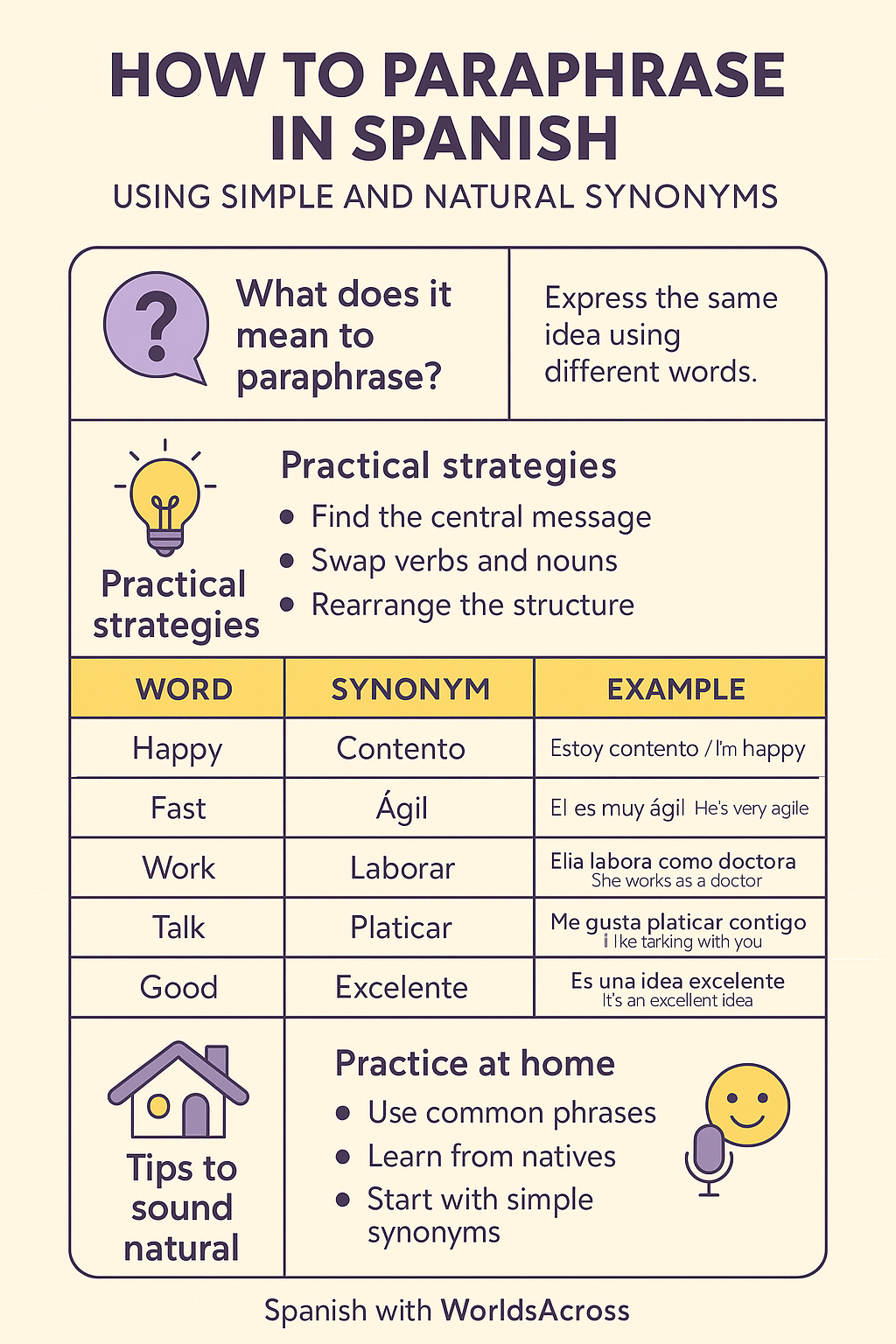How to Paraphrase in Spanish Using Simple and Natural Synonyms
It’s not about saying the same thing with different words. It’s about understanding it better and making it your own — a phrase you could say yourself if you master how to paraphrase in Spanish.
There’s something magical about saying things in your own words. Changing a sentence without altering its meaning not only shows comprehension — it also brings you closer to fluency. And here’s the good news: paraphrasing in Spanish doesn’t have to be complicated. In fact, with a few simple Spanish synonyms and practical strategies, you can express yourself naturally, sound more authentic, and even understand better what you read or hear.
Let me show you how to transform your sentences like a true Spanish speaker — without losing their essence. Ready?
What does it mean to paraphrase and why is it important?
To paraphrase in Spanish means to express the same idea using different words. It’s not about translating word-for-word — it’s about using your own terms to say the same thing.
This technique helps you avoid repetition, enrich your vocabulary, and improve your listening and reading comprehension.
For example:
-
Original: “Estoy muy cansado.”
-
Paraphrased: “Me siento agotado.” / I feel exhausted.
Both sentences communicate the same idea, but the second one adds variety. So, when you want to express yourself better, avoid sounding repetitive, or even improve your writing, this skill will be your best ally.
Practical Strategies to Paraphrase in Spanish
The key is to identify the core message and look for natural synonyms. Here are some easy strategies to apply:
-
Find the central message: Before changing a word, make sure you understand what it means.
-
Swap verbs for simpler equivalents:
“Necesito adquirir más experiencia.” → “Quiero ganar más experiencia.” / I want to gain more experience. -
Replace nouns with similar ones:
“Tuvimos una discusión acalorada.” → “Tuvimos una pelea fuerte.” / We had a strong argument. -
Rearrange the sentence structure without changing the meaning:
“No estoy seguro de que sea buena idea.” → “Quizás no sea una buena idea.” / Maybe it’s not a good idea.
These small changes let you paraphrase naturally — without sounding forced.
List of Simple Spanish Synonyms to Sound More Natural
Here’s a handy list of simple Spanish synonyms you can use when practicing:
| Original Word | Natural Synonym | Example (ES / EN) |
|---|---|---|
| Feliz | Contento / Alegre | Estoy contento / I’m happy. |
| Rápido | Veloz / Ágil | Él es muy ágil / He’s very agile. |
| Trabajar | Laborar / Ejercer | Ella ejerce como doctora / She works as a doctor. |
| Hablar | Conversar / Platicar | Me gusta platicar contigo / I like talking with you. |
| Comer | Alimentarse / Degustar | Vamos a degustar la comida / Let’s taste the food. |
| Bueno | Excelente / Adecuado | Es una idea excelente / It’s an excellent idea. |
| Problema | Dificultad / Complicación | Tuvimos una pequeña complicación / We had a small complication. |
Simple Exercises to Practice at Home
A fun way to improve is by doing small daily exercises. Here’s one:
Choose a daily phrase and rewrite it using synonyms:
Tengo que estudiar para el examen.
→ Necesito prepararme para la prueba. / I need to prepare for the test.
Rewrite small texts you hear or read:
If you hear: “No entiendo lo que dices.”
→ You could say: “No comprendo tus palabras.” / I don’t understand your words.
Practice out loud with a friend or tutor. The more you do it, the more natural it will sound.
These exercises will strengthen your confidence and make paraphrasing part of your everyday Spanish.
Final Tips to Sound Natural and Authentic
-
Use common phrases and avoid literal translations.
-
Pay attention to how native speakers talk — music, podcasts, and TV shows are your best friends!
-
Start with simple Spanish synonyms, and as you grow, use more complex expressions.
-
Remember: consistent practice is key. Don’t worry about making mistakes — that’s how you learn!
Every word you master, every sentence you improve, brings you one step closer to fluency. Paraphrasing well means understanding, connecting, and expressing yourself more clearly.

In summary…
Knowing how to paraphrase in Spanish is a powerful skill. It helps you improve your expression, sound more natural, and gain confidence with the language. By using simple Spanish synonyms, you can enrich your speech and understand more easily. All you need is motivation, practice, and a little creativity.
Are you ready to start paraphrasing with us?
You’re not alone. Learning Spanish may seem tough, but with strategies like this, everything flows more smoothly. Every word you discover is a new door to a vibrant culture. And remember: if you say it differently today, you’ll say it even better tomorrow.
There are communities, resources, and people ready to support you at every step. Some schools (like WorldsAcross) will guide you with professional help and cultural insights. You’re learning Spanish — and you deserve to express yourself clearly and confidently. Count on us to help you get there.


